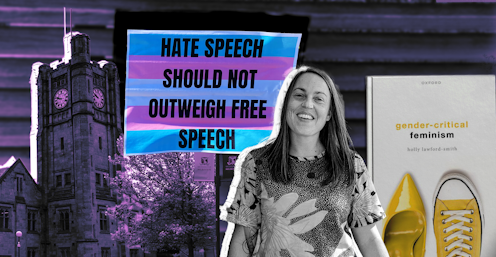Does the Fight Transphobia UniMelb campaign against a feminist philosopher violate academic freedom?
- Written by Hugh Breakey, Deputy Director, Institute for Ethics, Governance & Law. President, Australian Association for Professional & Applied Ethics., Griffith University

A campaign by the activist group Fight Transphobia UniMelb against feminist philosopher Holly Lawford-Smith[1] escalated[2] recently. There have been calls to boycott her course on feminism at the University of Melbourne. Posters and stickers around the campus and its environs have declared “Our demands: Transphobes and Nazis off campus” and that: “Only a Fascist takes ‘Feminism’”.
In response, Lawford-Smith has lodged a formal complaint with WorkSafe Victoria. She accuses the university of failing to provide her with a safe work environment, and to uphold academic freedom.
Fight Transphobia UniMelb has since stated[3] it will revise some of its stickers, but the activism continues.
Melbourne University, meanwhile, is reportedly[4] preparing to deploy security guards outside Lawford-Smith’s second-year feminism class.
University provost Nicola Phillips told The Age it has a “resolute commitment” to academic freedom, which extends to gender-critical perspectives being debated on campus and Lawford-Smith teaching her course. It also has a “positive obligation” to ensure transgender or gender diverse students can “participate fully in the life of the university”.
The campaign raises a host of challenging ethical questions.
Read more: What is essentialism? And how does it shape attitudes to transgender people and sexual diversity?[5]
What’s all the fuss about?
Lawford-Smith is a “gender critical feminist[6]”. (The term usually used by her opponents is “terf[7]”: trans-exclusionary radical feminist.) Lawford-Smith’s scholarly research and public engagements are critical of gender identity, arguing for the significance of biological sex.
Lawford-Smith is no stranger[8] to controversy. In 2021 she launched a website[9] collecting anonymous stories from women about their safety in women’s spaces opened to trans women. The website was condemned[10] by more than 1400 staff and students. In particular, sustained critiques[11] were raised against the website’s scholarly standards, challenging whether it warranted protection on the basis of academic freedom.
More recently, Lawford-Smith spoke at the controversial[12] “Let Women Speak Rally” in Melbourne, attended by far-right extremists – complete with Nazi salutes. In response, the activism against her intensified, linking her (and, it seems, her students) to fascism.
The case bears striking similarity to that of UK philosopher Kathleen Stock[13]. A long-running campaign from trans activists made Stock fear for her safety, driving her to resign.
Read more: Does public safety trump free speech? History suggests there is a case for banning anti-trans activist Posie Parker from NZ[14]
What’s academic freedom? Why is it important?
A key concern in considering the case is academic freedom. As Carolyn Evans and Adrienne Stone argue in Open Minds: Academic Freedom and Freedom of Speech in Australia[15], academic freedom differs from the more general notion of free speech.
















